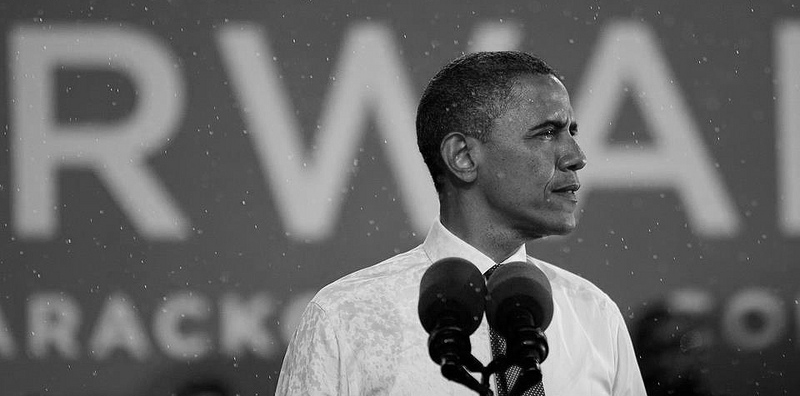The changing messages of Team Obama
Like many politicos I have a collection of maxims that guide my political analysis. Two of my favourites are 'change beats experience' and its counterpart: 'attack can beat change'. Together they have been the frame that has dominated the Obama/Romney contest...
Like many politicos I have a collection of maxims that guide my political analysis. Two of my favourites are ‘change beats experience’ and its counterpart: ‘attack can beat change’.
Together they have been the frame that has dominated the Obama/Romney contest since March. Obama’s Chicago headquarters has been conscious of its vulnerability to a ‘change’ argument at a time of economic fragility. The importance of negative campaigning was demonstrated by George H.W. Bush’s strategist Lee Atwater‘s. This master of political maxims argued that “perception is reality” during the 1988 campaign against Michael Dukakis. The Obama campaign proceeded to spend six months defining Romney on its terms, with terms like ‘Bain Capital’, ‘jobs killer’, ‘Swiss bank account’.
The result come the conventions was simple: Romney’s negatives (his poll numbers for favouribility, shares-my-values, strong leader etc.) were atrocious and the Obama campaign escaped too much examination of its own record. The press fed on the endless stream of Romney’s Olympic gaffes, bad ‘process’ stories and tax return pain.
Then something odd, refreshing and really rather beautiful happened at the convention in Charlotte: the campaign pivoted to positive.
For four days Democrats offered a full throated defence of the president’s record: they put the stimulus on display with pride for the jobs it saved, made great play of the auto-bailout, showcased civil rights progress such as equal pay legislation and the end of the ‘don’t ask, don’t tell’ law and, at long last, spoke of ‘Obamacare’ with pride.
Obama’s speech itself made a bold forward ‘offer’ putting investment in education and infrastructure front and centre. Hope and change were back.
The result? Obama’s numbers hit new highs. The narrative from there to the debates was one of spiralling doom for Romney’s team in Boston, with Chicago in the ascendant.
It was seen as a clever one-two punch. First, Democrats defined Romney, so that he suffered from that most dangerous of maxims: ‘losing control of his public image’. Second, they sold an Obama who had delivered on change amidst an atmosphere full of hope for the future. After all, as Bill Clinton is wont to note, “elections are about the future, not the past”.
Then the first debate happened and Chicago was sent spinning. Romney’s carefully (de)constructed image was recast by his masterful performance of total rebranding (“Etch-A-Sketch” anyone?). It was only the combination of subsequent superb Biden/Obama debate performances and remarkable ‘ground’ game that held the line for the Democrats.
But in the ‘air-war’ the Obama message kept changing. Suddenly it became “Romnesia“, an attack that attempted to connect flip-flopper Mitt with conservative extremist Mitt. It was Bill Clinton who famously convinced Team Obama back in the spring to hit Romney on extremism not flip-flopping. Now the campaign was back to the latter. But they were trying to have their cake and eat it too.
Now, for aficionados of the dark arts of ‘messaging’ it is worrying how often Chicago have violated another of Atwater’s axioms: ‘choose the ditch you’re gonna die in’. Translated, this says: pick your message at the start of the campaign and stick with it to the end, as it’s almost always better to have picked wrong than to try and correct during the campaign.
So consider this: Chicago started with attack on Mitt, went briefly positive in May, went back to attack, went positive at the convention and then went to a different type of attack. Then, last week the TV ads were back to bashing Bain. Now, the campaign says Obama will close positive. That’s a lot of different ditches.
All campaigns run positive alongside negative but the synthesis needs to be elegant lest it jar with the voter. And on the negatives the Obama team’s attempt to frame Romney as both a flip-flopper and an extremist was a failure to choose between the two and felt like a contradiction to voters.
By contrast the campaign’s ground game has been incredibly consistent: for two years now, fuelled by some fearsome analytics, the Democrats have systematically categorised their target voters into ‘mobilisation’, ‘opposition’ and ‘persuasion’ pools and then ruthlessly pursued them, with an army of field organisers who’ve never taken their eyes off the prize. And this has paid off in the battlegrounds big time.
For in the ‘firewall’ state of Ohio these organisers haven’t just been selling attack lines, they’ve been selling a successful record. Specifically, they talk about the auto-bailout which beautifully contrasts Obama’s record of change with Romney’s belief that Detroit should have gone bankrupt (taking with it the one eighth of Ohio jobs which depend on the auto industry).
Consistency. Clarity. Contrast. A positive message and a sharp attack. Delivered day in, day out. That’s more like it.
When Obama wins on Tuesday he will have a lot of field-hands and Rust Belt message ‘mavens’ to thank. And some hard questions to ask of his campaign’s strategic national messaging. Perhaps it’s time to remember that other axiom: the left wins when it runs on hope not fear.
